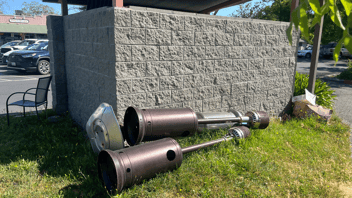Examining the Environmental Toll of Overhead Patio Heaters

The Carbon Footprint of Outdoor Comfort
As the sun sets and the temperature drops, the allure of a cozy outdoor gathering remains strong. Enter patio heaters – those ingenious devices that have become synonymous with extending our outdoor comfort well into cooler seasons. While the popularity of patio heaters is undeniable, it's essential to take a closer look at their environmental impact. This blog aims to delve into the carbon footprint of patio heaters, shedding light on the environmental consequences and exploring sustainable alternatives that align with the responsible choices we ought to make.
Understanding Patio Heaters
Patio heaters, once a niche accessory, have surged in popularity and can now be found in various outdoor settings, from restaurants to residential backyards. They encompass an array of types, such as freestanding propane heaters, wall-mounted electric heaters, and tabletop units. Patio heaters have come to prevalence as a way to keep outdoor spaces warm in colder temperatures. Patios, decks, and outdoor dining areas are popular places in which patio heaters are found.
Propane patio heaters operate by burning propane fuel to generate heat. These heaters typically consist of a propane tank connected to a burner at the top of the unit. As the propane is ignited, it produces a flame that heats a metal or ceramic element, which in turn radiates heat to warm the surrounding area. While this mechanism may seem straightforward, the energy consumption and wastage associated with propane patio heaters are considerable.
The Environmental Consequences
Patio heaters contribute to greenhouse gas emissions, a significant driver of climate change. Carbon dioxide (CO2) and other greenhouse gases trap heat in the atmosphere, leading to rising temperatures and detrimental environmental effects. Propane is a fossil fuel, and its combustion releases carbon dioxide (CO2) emissions into the atmosphere, contributing to climate change. The high fuel consumption of patio heaters not only leads to wasted energy but also increases the carbon footprint associated with outdoor activities. Additionally, burning propane produces a host of other nasty chemical compounds you don't want to breathe. Substances such as sulfur dioxide, nitrogen oxides, nitrous oxide, carbon monoxide, and methane can be found in the particulate matter released from fossil fuels in addition to CO2.
The planned obsolescence and inability to recycle parts associated with many patio heater models further exacerbate their environmental impact. Patio heaters, often designed with a short lifespan in mind, are non-recyclable and non-biodegradable. The materials used in the construction of patio heaters, including metals, plastics, and electronic components, pose a significant challenge to recycling efforts. Burner malfunctions and ignition problems are common issues with propane heaters, rendering them into useless heaps that contribute to junkyard waste.
Energy Source: Propane vs. Electricity
One of the fundamental aspects contributing to patio heaters' carbon footprint is their energy source. In the realm of energy sources for patio heaters, propane stands as a prevalent choice for conventional models. Propane, a hydrocarbon gas derived from fossil fuels, offers a portable and readily available source of heat. However, its convenience comes at an environmental cost. When propane is burned, it releases carbon dioxide (CO2) and other pollutants into the atmosphere, contributing to the greenhouse effect and climate change
In contrast, electric patio heaters may seem like a greener choice, but their electricity consumption can also contribute to carbon emissions if not sourced from renewable energy. While their direct carbon footprint is lower due to the absence of on-site combustion, their overall environmental impact is contingent on the energy grid's sources. The shift from propane to electricity raises questions about the true sustainability of the chosen energy source, highlighting the importance of scrutinizing the broader environmental implications of our choices.
Efficiency and Energy Consumption
Energy efficiency plays a pivotal role in minimizing the environmental consequences of patio heaters. Unfortunately, these devices often lack efficiency, leading to wasteful energy consumption and increased carbon emissions. These devices, often designed without stringent energy conservation considerations, result in excessive energy use and subsequent greenhouse gas emissions. The energy consumption and wastage associated with patio heaters are a significant concern, as much of the heat generated escapes into the surroundings rather than being effectively utilized.
Although many people still implement patio heaters, it's important to acknowledge the toll they take on our planet. However, there are ways to reduce your carbon footprint, such as utilizing more advanced heating technologies.
Alternative Options for Outdoor Comfort
The good news is that sustainable alternatives are available for achieving outdoor comfort. Heated furniture, for instance, is an innovative concept that combines warmth with functionality. These pieces incorporate heating elements into their design, reducing the need for separate heaters and lowering energy consumption. By opting for such alternatives, we not only minimize our carbon footprint but also reap the benefits of smarter, eco-conscious choices.
Galanter & Jones crafts stylish, functional, sustainable heated furniture that is suitable for any atmosphere. The pieces are more energy efficient than patio heaters and do not contribute to CO2 emissions. With a strong emphasis on sustainability, the Galanter & Jones supply chain is as eco-friendly as possible, from the factory to your door.
The carbon footprint of patio heaters serves as a poignant reminder that our choices carry weight beyond our immediate surroundings. By educating ourselves and our readers about the environmental consequences of these devices, we can encourage a shift towards more sustainable outdoor comfort options. Let's remember that every decision we make – from the energy sources we choose to the products we endorse – has a collective impact on the environment. As we wrap ourselves in the warmth of knowledge, let's also wrap our planet in a sustainable embrace.
Contact Galanter & Jones today to learn more about our unique and innovative heated furniture and find the best piece for you.



